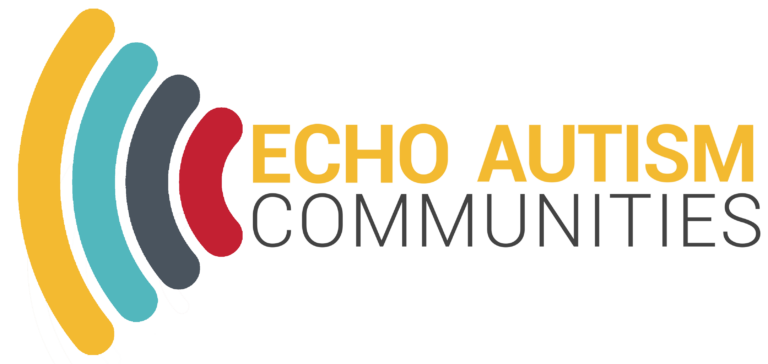- Home
- Resources
- On-Demand Symposium
- Resources
- What is Autism
- How is Autism Diagnosed?
- Communication Styles in Autism
- Supporting Autistic People and Their Family & Friends
- Supporting Early Development
- Common Co-Occurring Mental Health
- Behavior
- Common Co-Occurring Medical Health
- Understanding School-based Supports
- Safety
- Toileting
- Puberty & Hygiene
- Transition to Adulthood
- Sexuality and Romantic Relationships
- Employment
- Tools for Professionals
- Advocacy
- On-Demand Webinars
- Blog
- Expert Videos
- Challenging Behavior
- Getting an Autism Diagnosis | Experts Speak Out
- Communication
- After the Diagnosis
- Speech vs. Language
- ABC’s of Behavior
- What is ABA Therapy?
- Keep Going
- Communication Challenges Can Affect Behavior
- Prioritizing Interventions to an Individual
- A Diagnosis Is Not About the Label
- Adults Can Get an Autism Diagnosis
- FAQ’s
- Newsletters
- EAC Directory
- Join ECHO Autism
- Start an ECHO
- Symposium
- Shop

About Us



What is ECHO Autism Communities?
ECHO Autism Communities is a virtual learning community for a variety of professionals who serve autistic people and people with other disabilities. ECHO Autism is committed to building global communities where people see possibilities in all abilities. We provide professional development focused on best practices for clinicians, health professionals, educators, and advocates who work with individuals on the Autism spectrum and their families.



ECHO Autism Communities Team
Kristin Sohl, MD, FAAP
Executive DirectorValeria Nanclares, PsyD
Director of Program Development and Global ExpansionMelinda Odum, MSW, LCSW
Associate Director of Training and OutreachRobin Hardesty, BS
Associate Director of Program and ExpansionMelissa Mahurin, BA
Associate Director of Research and Data ManagementBrandy Dickey
Program CoordinatorRamiro Mitre
Program CoordinatorSarah Towne
Program CoordinatorShawna Shelton, RN, BSN
Nurse ClinicianKatrina Boles, PhD
Data AnalystJackie Jiordano, BGS
Research SpecialistCourtney Le
Program CoordinatorBlake Hinkel
Office Support Assistant 1
ECHO Autism Communities Mission
Salient Features That Guide Our Work:
- We are committed to eliminating inequities for people with autism and their families.
- We are committed to empowering individuals, families, and professionals to make a difference in the lives of people with autism.
- We intentionally innovate to challenge the status quo.
- We build connections and leverage the power of the ECHO Autism network to accelerate meaningful collaboration.
- We are committed to shifting the paradigm of how communities include people with autism and how people with autism experience their community.
- We equip, mentor, and empower professionals, organizations, communities, families, and autistic persons in best practices as a trusted source for resources and expertise on ASD.
The Autism Team Wishes to Be the Team That:
- Is committed to excellence, innovation and improving the lived experience of autism families. We don’t let perfect be the enemy of good.
- Is proactive, always thinking about the future and how to move the team forward. Being able to think ahead allows for innovation and creativity. We create a supportive and trusting environment that catalyzes innovation.
- Models shared responsibility to keep our eye on the mission for decision making, action, and achieving excellence. We assume actions start from a place of good intention. We trust one another and our mission so that we can be vulnerable to each other. We practice gracious giving and do not value owning all the credit. We practice letting go of egos and democratizing information.
- Lives our core value of helping others by supporting our teammates. We are invested in each other’s growth and give constructive and actionable feedback. We hold each other accountable as we seek to continuously improve our individual work and the work of our team. We are always striving to be better and for the betterment of everyone.
- Values different perspectives and skills and recognizes that we need a balance of perspectives to have high performing teams. We practice self-discovery and understanding of our relative strengths within the team and build on each person’s strengths to produce better products and processes. We embrace entering the uncomfortable range as this leads to personal growth.
- Actively nurtures relationships among the team, those that we interact with, and the communities we serve. Strong relationships make it easier to say yes to the “ask”. Relationships bring strength, opportunities, and help find connections.
- Celebrates our teams’ accomplishments, big and small. We find ways to demonstrate the value of others’ contributions. The celebrations fuel our passion for work, build confidence, and strengthen the bonds of our team.
Our Values in Action
- Person Family Centered Care
- Whole care for the whole family
- All Teach, All Learn
- Embrace Curiosity
- See the possibilities in all abilities
ECHO Autism Communities recognizes that there are different opinions and positions on the language used within the autism community. Person-first language puts the person before their condition or disability (i.e., “children with autism”) to avoid defining or categorizing someone based on a condition or trait, whereas identity-first language puts the person’s condition or disability before the person (i.e., autistic people). We acknowledge people’s personal preferences and individual rights to decide how they’re described. Many autistic people, autism experts, as well as advocates, prefer identity-first language because it indicates that being autistic is an inherent part of a person’s identity. Therefore, we will use both person-first and identity-first language indiscriminately to include all opinions and respect personal choice in the matter.

K
Attendees
K
Programs Completed
+
Credits Earned
%
Participation RATE

OUR IMPACT















